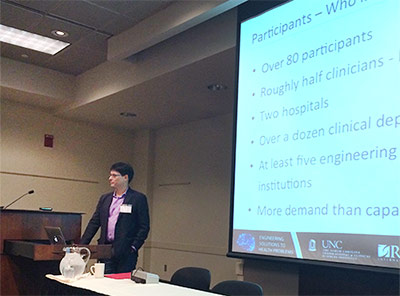Successful Research Collaborations follow “Engineering Solutions to Health Problems: A Workshop”

On April 17, 2015, at The William and Ida Friday Center, the NC TraCS Team Science Resource successfully connected engineers and clinicians in a workshop entitled “Engineering Solutions to Health Problems,” in order to build research relationships and durable, feasible projects for the future.
During this workshop, groups of clinicians and engineers worked on one of four broad categories – Mobile Health, Clinical Devices, Rehabilitation, and a Wild-Card category – to create potential research projects. The NC TraCS Team Science Resource follows up with these collaborators quarterly to check the progress of these projects.

The goals of the workshop were to promote cross-disciplinary collaborations between engineers and clinicians and capture the products of these collaborations. The workshop also aimed to measure research productivity, and examine the sustainability of these collaborations for 12 months following the workshop, as well as create an engineering and health interest group to engage members of that group in relevant activities post-workshop.
The workshop attendees produced “need statements” that were then thoroughly discussed in working groups throughout multiple sessions and molded into feasible research projects. For instance, one group articulated that there needed to be a way to decrease the pain from injections or blood draws in order to reduce infection and increase treatment compliance. In a brainstorming environment, clinicians and engineers were able to discuss the possibilities of solving this problem and committed to continued collaboration on this project. On a quarterly basis, collaborating groups will be asked to comment on their productivity with the project thus far, and will be asked if they need the resources to keep moving forward.
Because of the enthusiasm displayed from workshop attendees, a shorter workshop was held at the School of Nursing at the University of North Carolina at Chapel Hill. This workshop, a spinoff of the previous one, was entitled “Engineering a New Wave of Nursing Science” and worked to bring together engineers and practitioners in nursing to work on one of four sub-categories of projects: sensing, communicating, nanotechnologies, and behavioral self-regulation. This one-hour workshop expanded on “need statements” and created well-articulated project ideas. Out of the 20 project ideas created during this workshop, 10 are being actively pursued now as NC TraCS Team Science works to connect workshop attendees with engineer collaborators.
The NC TraCS Team Science Resource promotes interdisciplinary collaborations in many ways, including developing workshops and other activities that provide an environment conducive for large groups of investigators to work together on projects that are key to their research programs.
This event was sponsored by the Joint Department of Biomedical Engineering at NC State University and UNC Chapel Hill, The North Carolina Translational and Clinical Sciences Institute and The NSF Nanosystems Engineering Research Center for Advanced Self-Powered Systems of Integrated Sensors and Technologies (ASSIST); with collaboration from RTI International and North Carolina A&T State University.
- Created on .